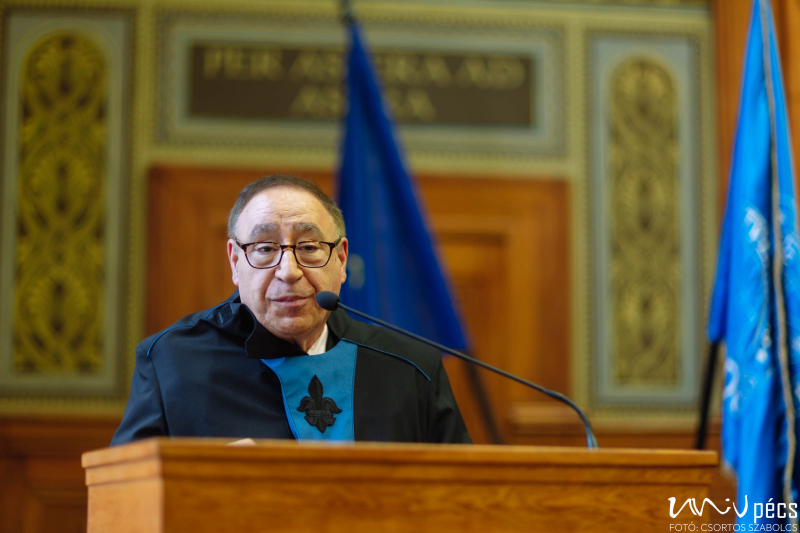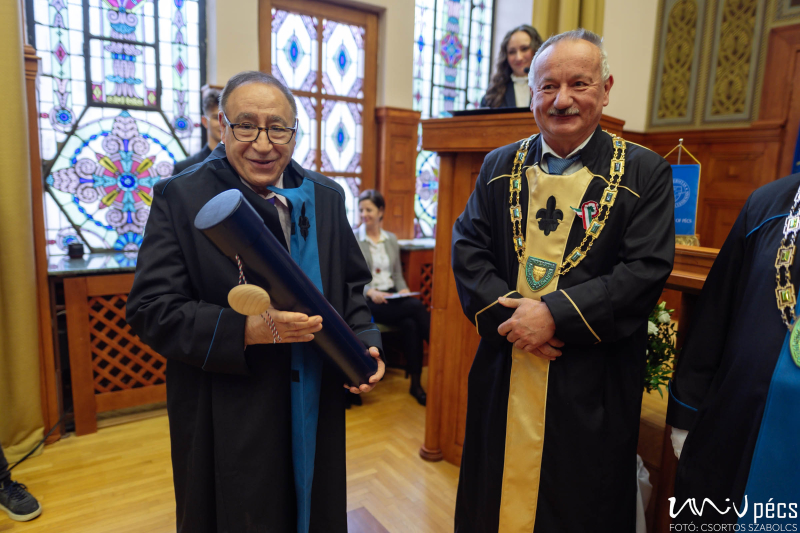Metin Akay, founding chairman and John S. Dunn Endowed Chairman of the Biomedical Engineering Department of the Cullen College of Engineering, has received an honorary doctorate from the University of Pécs, one of Europe's oldest and most respected institutions of higher learning.
Akay was awarded the doctorate at a ceremony in Halasy-Nagy József Hall at the university on March 9. Akay delivered a speech to the students of the university as part of the ceremony.
“It is important to listen to young people, because they are the ones who talk about the future,” Akay said, noting that they would lead to significant advances when it came to healthcare and helping remote or underserved populations.
“Data Science has a great future ahead of it, which, in my opinion, will gain strength in all fields of science, and I am convinced that medicine is no exception to this. Data Science (Machine Learning/AI) has already revolutionized healthcare engineering, systems, delivery,
industry, medical practice and education and will continue improving the quality of healthcare at a much faster pace in the near future.”
“The time has come for the application of artificial intelligence in both engineering activities and healthcare. The metaverse allows the physical reality and the virtual environment to mix. Thus, questions such as how we can free healing from physical presence, even communicate with each other through avatars, making medical knowledge available even in remote places, so that adequate health care is available to all citizens of the world, come to the fore.
Akay added, “Healthcare innovations should be more affordable, scalable and equitable, and especially should be used to combat health disparity. Climate changes also affect the health, well-being and mental health of the global population. We need to develop resilient healthcare systems and stable infrastructure for any disruption caused by climate changes."
Finally, he pushed for improvements to medication for astronauts.
“Innovations for Space Medicine are crucial to assess the well-being of astronauts, both on the Earth and in space to perform their duties without any interruption,” he said. “Therefore, compact, portable intelligent micro-nano medical devices are needed onboard to check the health status of astronauts.”
He acknowledged all of his students, postdocs and collaborators from Dartmouth to ASU and UH for their contributions, which led to this award.
The Pecs university was established in 1367, when it was created by a decree of King Louis I of Hungary and Pope Urban V. The medical school at the university is one of only four in Hungary.
The university has become one of the most famous, prestigious institutions having a leading role in regional education. It has 10 faculties that cover the full spectrum of high-quality higher education.
Akay joined the faculty at the University of Houston in 2010, as the founding chairman of the Biomedical Engineering Department. He previously served as a professor and interim chairman of the Harrington Department of Bioengineering at Arizona State. He is a native of Turkey, earning his B.S. and M.S. in Electrical Engineering from Bogaziçi University in Istanbul in 1981 and 1984, respectively. He received his doctorate in Biomedical Engineering from Rutgers University in 1990.
In 2015, Aalborg University also awarded him with an honorary degree. Then, in 2021, the Silesian University of Technology in Poland also awarded him an honorary degree. In that same year, he was also elected chairman of the governing council for the International Academy of Medical and Biological Engineering (IAMBE), and voted president of Institute of Electrical and Electronics Engineers (IEEE) Engineering in Medicine and Biology Society (EMBS).
Finally, Akay was elected to chair the IEEE BRAIN Technical Community. He was recently appointed as the Chief Ambassador of the IEEE EMBS.
A summary of the event was provided by the university. A version in English can be read via Google Translate. All photos courtesy the University of Pécs.

![Yasemin and Metin Akay [second and third from left] pose with officials from Hungary after Metin Akay received his honorary doctorate. Yasemin and Metin Akay [second and third from left] pose with officials from Hungary after Metin Akay received his honorary doctorate.](/sites/ccoe.egr.uh.edu/files/images/news/2023/metin-akay-hungary-yasemin-01-crop.jpg)
